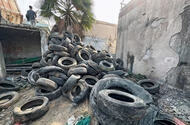The issue of used tyre disposal is more than just a logistical challenge; it’s a pressing environmental crisis that’s quietly unfolding on a global scale. With millions of tyres being exported from the UK each year, the loopholes in regulations are allowing these waste products to end up in places where environmental standards are alarmingly lax. This has sparked a call to action from industry leaders who are urging the government to take decisive steps to address the situation.
What’s the T8 Exemption and Why Does It Matter?
At the heart of this issue is the T8 exemption, a regulation that was initially designed to facilitate the recycling of waste tyres in low-risk sectors. This exemption allows for the export of up to 40 tonnes of used passenger car tyres per week without the need for rigorous environmental permits. While the intention was to streamline recycling processes, it has inadvertently opened the door for exploitation.
Darren Lindsey, the head of the British Tyre Manufacturers’ Association (BTMA), has been vocal about the urgent need to close this loophole. He points out that while the exemption was meant to support legitimate recycling efforts, it has instead become a vehicle for unscrupulous waste collectors to offload tyres to countries like India, where they are often burned rather than recycled. This practice not only violates environmental standards but also poses significant health risks due to the toxic emissions released during tyre incineration.
How Many Tyres Are We Talking About?
To put things into perspective, around 50 million tyres are discarded in the UK annually, with approximately half of these being exported. That’s a staggering number, and it highlights the scale of the problem. The BTMA estimates that about 1,000 tonnes of waste tyres leave the UK every day, often under the guise of being recycled. However, investigations have revealed that many of these tyres are ending up in the hands of black market operators who burn them, creating a toxic legacy.
What Are the Consequences?
The consequences of this unchecked practice are severe. Burning tyres releases harmful pollutants into the atmosphere, contributing to air quality issues and posing health risks to communities near these operations. Moreover, the environmental damage extends beyond immediate health concerns; it undermines the integrity of the UK’s recycling industry.
Peter Taylor, secretary general of the Tyre Recovery Association (TRA), emphasizes that the current regulatory framework is failing. He advocates for the end of the T8 exemption and suggests that tyres should be shredded before export to minimize the risk of poor practices abroad. Taylor has been campaigning for this change since 2018, highlighting that a growing number of collectors are willfully ignoring the law.
What’s the Government Doing About It?
In response to these concerns, the Department for Environment, Food and Rural Affairs has indicated that it is reviewing waste and resource priorities, including the potential removal of the T8 exemption. However, many in the industry feel that action is needed sooner rather than later. The longer the loophole remains, the more damage is done—not only to the environment but also to the UK’s capacity to manage its own waste effectively.
The UK has the infrastructure to recycle a significant portion of its waste tyres, potentially up to 80%. However, as long as the T8 exemption persists, investment in the recycling sector is stifled. Without legislative action, the risk is that the recycling infrastructure could collapse, leaving the country with even fewer options for responsible tyre disposal.
What Can Be Done?
The call for stricter controls and traceability measures is more than just a plea from industry leaders; it’s a necessary step toward sustainable waste management. By tightening regulations and ensuring that exported tyres are genuinely recycled rather than incinerated, the UK can take a significant step toward mitigating this environmental crisis.
The big takeaway? Addressing the used tyre crisis isn’t just about compliance; it’s about creating a sustainable future. By advocating for smarter regulations and responsible practices, we can protect both our environment and our communities. If you’re involved in the industry or simply a concerned citizen, consider supporting initiatives that promote responsible recycling practices. Small changes can lead to significant impacts, and together, we can make a difference.

